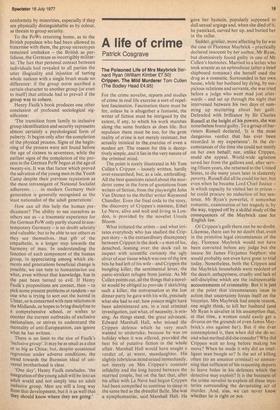A life of crime
Patrick Cosg rave
The Poisoned Life of Mrs Maybrick Bernard Ryan (William Kimber £7.50) Crippen. The Mild Murderer Tom Cullen (The Bodley Head.£4.95)
For the crime novelist, reports and studies of crime in real life exercise a sort of repellent fascination. Fascination there must be for, unless he is altogether a fantasist, the writer of fiction must be intrigued by the extent, if any, to which his work marches along the same borders as does life. But repulsion there must be too, for the grim reality of crime is not merely resistant, but actually inimical to the.exercise of even a modest art. The reason for this is deceptively simple, and it lies in the very nature of the criminal mind.
The point is nicely illustrated in Mr Tom Cullen's Crippen — loosely written, hardly over-researched, but, as a tale, enthralling. All the best questions raised about the murderer come in the form of quotations from writers of fiction, from the playwright John Van Druten to the thriller writer Raymond Chandler. Even the final coda to the story, the discovery of Crippen's mistress, Ethel Le Neve, alive and well and living in London, is provided by the novelist Ursula Bloom.
What irritated the artists — and what irritates everybody who has studied the Crippen story — is the extraordinary discrepancy between Crippen in the dock a man of ice, detached, leaning over the dock rail to inspect with scientific curiosity the ugly sliver of scar tissue which was one of the few bits he had left of his wife —and Crippen the bungling killer, the sentimental lover, the panic-stricken refugee from justice. As Mr Cullen points out, all the things that a novelist would be obliged to provide it' sketching such a killer, the conversation at the last dinner party he gave with his wife, precisely what she had to eat, how poison might have been administered are, in a real criminal investigation, just what, of necessity, is missing. As things stand, the great advocate, Edward Marshall Hall, who missed the Crippen defence which he very much wanted to undertake, because he was on holiday when it was offered, provided the best bit of putative fiction in the whole affair. Marshall Hall would have sought a verdict of, at worst, manslaughter. His slightly lubricious mind seized immediately, not merely on Mrs Crippen's constant infidelity and the long hatred between the married couple, but on the fact that, after his affair with Lc Neve had begun Crippen had been compelled to continue to sleep in the same bed as the dreadful Belle. She was ti nymphomaniac, said Marshall Hall, He 'gave her hyoscin, popularly .supposed to dull sexual urgings and, when she died of it, he panicked, carved her up, and buried her in the cellar.
Sadder, grislier, more affecting by far was the case of Florence Maybrick — practically declared innocent by her author, Mr Ryan, but dismissively found guilty in one of Mr Cullen's footnotes. Married to a lecher who took arsenic astin aphrodisiac (after a brief shipboard romance) she herself used the drug as a cosmetic. Surrounded in her own house, while her husband lay dying, by suspicious relations and servants, she was tried before a judge who went mad just afterwards — and sat up through the night that intervened between his two days of summing up muttering about her guilt. Defended with brilliance by Sir Charles Russell at the height of his powers, she was nonetheless found guilty. To a group of barristers Russell declared, 'It is the most dangerous verdict that has ever been recorded in my experience'. In the circumstances of the time she could not testify on her own behalf; nor, unlike Crippen, could she appeal. World-wide agitation saved her from the gallows and, after serving fifteen years, she returned to the United States, to die many years later in slatternly poverty. Russell did all he could for her, but even when he became Lord Chief Justice — in which capacity he visited her in prison — he could procure no reduction of her sentence. Mr Ryan's powerful, if somewhat romantic, examination of her tragedy is, by the way, topped off by a skilful study of the consequences of the Maybrick case for English law.
Of Crippen's guilt there can be no doubt. Likewise, there can be no doubt that, even in the primitive legal circumstances of the day, Florence Maybrick would not have been convicted before any judge but the insane Sir James Fitzjames Stephen: she would probably not even have gone to trial today. Nonetheless, both the Crippen and the Maybrick households were redolent of the deceit, unhappiness, cruelty and lack of self-discipline which are the indispensable accoutrements of criminality. But it is just at the point that 'circumstances issue in action that uncertainty forces itself on the historian. Mrs Maybrick had ample reason, one might think, to kill her husband (and Mr Ryan is cavalier in his assumption that, at that time, a woman could easily get a divorce on the grounds of even James Maybrick's sins against her). But it' she aver contemplated it, then when did she do so; and what method did she consider? Why did Crippen wait so long before making his move? When he made it why did an intelligent man bungle so? Is the act of killing often (to an amateur criminal) so unmanning that sufficient of his reasoning departs to leave holes in his defences which the detective may exploit? It is the business of' the crime novelist to explain all these mysteries surrounding the devastating act of murder. And, alas, we can never know whether he is right or not.


































 Previous page
Previous page